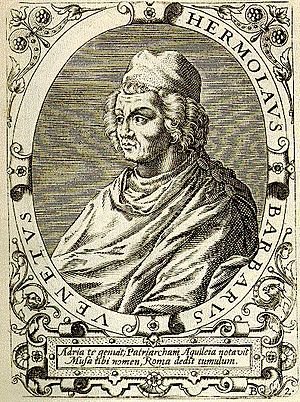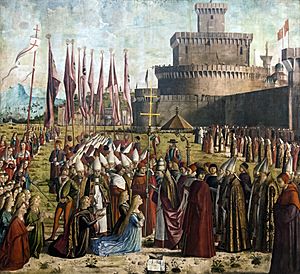Ermolao Barbaro facts for kids
Ermolao Barbaro (born May 21, 1454, died June 14, 1493) was an important Italian scholar during the Renaissance period. He was known for his deep knowledge and his work in translating and correcting ancient texts. He also had a career in politics, even though he preferred studying.
Early Life and Learning
Ermolao Barbaro was born in Venice, Italy. His father, Zaccaria Barbaro, was a politician and diplomat. Ermolao often traveled with his father, which meant he studied in different places outside Venice.
He learned a lot from his uncle, also named Ermolao, in Verona. In 1462, he went to Rome to study with famous teachers like Pomponius Laetus and Theodorus Gaza. By 1468, he was back in Verona. There, Frederick III honored him for his poetry.
Ermolao finished his studies at the University of Padua. In 1477, he became a professor of philosophy there. He returned to Venice for a short time. However, he went back to Padua when the plague spread in his hometown.
Political Roles
Barbaro had an active political life. He often felt these duties took him away from his beloved studies. In 1483, he was chosen to be part of the Senate in Venice. When he was only twenty, he gave a speech at the funeral of Doge Nicholas Marcello in 1474.
In 1486, he was sent to Bruges to represent Venice. In 1488, he held an important government job called Savio di Terrafirma. He became an ambassador to the Duchy of Milan in 1489. In 1490, he was appointed ambassador to the Holy See (the Pope's government).
In 1491, Pope Innocent VIII offered him an important church position. This was to be the Patriarch of Aquileia. However, Venetian law said that ambassadors could not accept gifts or jobs from foreign leaders. There was also a disagreement between Venice and the Pope about who should choose the Patriarchs.
The Venetian Senate told Barbaro to refuse the position. But Pope Innocent and the next Pope, Alexander VI, said they would punish Barbaro if he gave up the job. Because he did not obey Venice, the Senate removed him as ambassador. They also sent him away from Venice. They threatened his father, Zaccaria, with the same punishment, but his father died soon after.
Ermolao Barbaro then lived in a Roman villa in Rome. He died there from the plague in 1493. He was buried at the church of Santa Maria del Popolo.
Important Writings
Ermolao Barbaro spent much of his life working on classical texts. He edited and translated many old works. These included Aristotle's Ethics and Politics (1474). He also worked on Aristotle's Rhetorica (1479). He translated Themistius's Paraphrases of some of Aristotle's works (1481). Another important work was Castigationes in Pomponium Melam (1493).
His most famous work was Castigationes Plinianae. It was published in Rome in 1492. In this book, Barbaro made about 5,000 corrections to Pliny's Natural History. He wrote this book in just twenty months. It was dedicated to the new Pope, Pope Alexander VI. Many people at the time thought it was the best work on Pliny. Even before he died, Barbaro was seen as a top expert on ancient Greek and Latin writings. Erasmus, another famous scholar, often mentioned Barbaro's works with respect.
His letters to Giovanni Pico were also widely read. Many of his works were published after his death. These include In Dioscuridem Corollarii libri quinque about Dioscorides (1516). His translations of Aristotle came out in 1544. Compendium Scientiae Naturalis was published in 1545.
Barbaro's book De Officio Legati was very important. It showed new ways that diplomacy (how countries talk to each other) was changing during the Renaissance.
See also
 In Spanish: Ermolao Barbaro para niños
In Spanish: Ermolao Barbaro para niños
 | Valerie Thomas |
 | Frederick McKinley Jones |
 | George Edward Alcorn Jr. |
 | Thomas Mensah |



